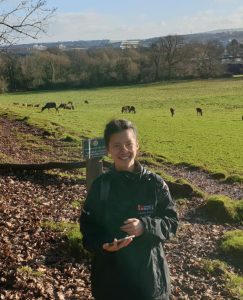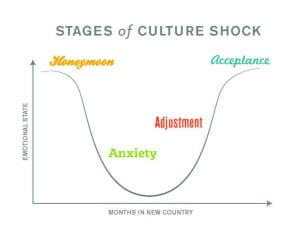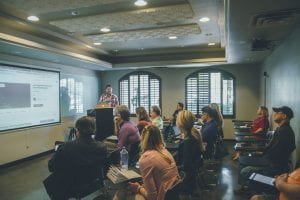Written by Emma Yi Kwan Lau, Student Digital Champion.

The start of November means we are fully on our way into term! As the dust settles on freshers, it’s time for all of us to start preparing ourselves for our studies and continue with our learning. Academic work at the university requires us to be competent and confident at our digital skills. These skills may be a bit rusty to us as returners after a long summer break. They may also be entirely new to all our freshers. The comprehensive list of digital skills is long, however, I would like to take this opportunity to share my experiences studying at the Bristol and the top skills that I find useful for my learning.

Experiences as an international student
Some of you may be in the same boat as me – coming abroad to the UK for higher education. It may be your first time leaving home and living on your own. It may be your first time to use English as the only teaching language. Everything may seem a bit daunting and overwhelming. If you are a new student, everything is probably new and unfamiliar to you. There are some tips that I would like to share with you and hopefully that may help to relieve your nerves. Even if you are a returning student, you may still experience a shock after a long summer break so the following tips can also be helpful to you.
A lot of us would have heard of cultural shock. However, what exactly is cultural shock? It refers to feelings of uncertainty, confusion, or anxiety that people may experience when moving to new country or surroundings.

Everything in the UK can be very different from home if it is your first time moving away from your home country. To minimise cultural shock, it is crucial to keep yourself busy. Joining societies is a great way to mingle with people and keep yourself away from experiencing cultural shock. There are many cultural societies which offer platforms to meet students from your home country or those with similar cultural backgrounds.
Other than extracurricular activities, it is also worth considering engaging in different job opportunities offered by the university. Not only will you make friends, but it’s also is a fantastic opportunity to boost your CV and gain skills to be ready for your future career.
Regardless of our cultural backgrounds, all students face the same difficulties in transitioning from college or high school to university. Firstly, higher education requires more independent learning. Therefore, self-discipline and time management become more important. Also, there are more online components in the university’s teaching syllabus. This is why the university offers a range of support to freshers to help with the transition.
This shock is also applicable to our returners. After a long summer break, it may take a while for us to resettle in. In addition, the content becomes more difficult as we progress to senior years (year 2/3/4/5). Therefore, I would like to introduce the five skills to our returners too.
Digital Notetaking
As the new academic year starts, a lot of us may start trialling new note taking methods by using a different apps. Three popular note taking platforms are called Notion, OneNote and Evernote. They all have their pros and cons. However, the key consideration in digital note taking is not exactly about the application we use, it’s more about considering how we use it, and does it fit into the way we work. I highly recommend my peers to do research on the application they decide to use to ensure it suits them.
Selecting Digital tools
Speaking of us picking new note taking applications, we should also think about selecting other digital tools. An example of a digital tool is a digital note taking platform that we mentioned above. Other aspects that digital tools help with include networking, blogging, and timetabling. As we may be aware, independent learning is an important part of studying whilst at the university. Learning how to select the right apps will be vital for us. I would also recommend having a look at the Appinion series on DigiTalk where me and other students share experiences of using various digital tools.
Office 365
Speaking of digital tools, we must not forget about Microsoft 365. It is a service that provides access to a suite of Microsoft Office applications and other productivity services. It includes popular applications such as Word, Excel, PowerPoint, and Outlook, as well as other services such as OneDrive, SharePoint, and Microsoft Teams.
As a student at the University of Bristol, we have free access to all features of Microsoft 365. To explore all functions of Microsoft 365 and how to install, have a read of the resource below offered by the DEO – Microsoft 365 Support – Office 365 help (sharepoint.com) .
Blackboard
Blackboard is the main platform where all teaching materials are uploaded and delivered if the session is asynchronous or live online. It may all be familiar to our returners. It would be worth both our freshers and returners having a look at Digitally Ready course to familiarise the layout and functions of Blackboard.
Making the most of the services offered at the University
We have mentioned various applications we can use to maximise our digital learning experiences whilst at the university. It is also worth noting that the importance of utilising other university services online. These include the Study skill services, Library services, Disability services and IT services. Many resources are available online and you can navigate to relevant webpages through Blackboard. There is also a section in Digitally Ready course where you can explore the roles of study skill and library services, as well as how to reach out for help.

Working as a Student Digital Champion
One of the job opportunities offered by the university is a Student Digital Champion. This year I was lucky enough to be given the opportunity to be part of the student worker team at the Digital Education Office (DEO).
Due to the outbreak of COVID-19, my first year of teaching was altered into a blended learning method with majority of the teaching online and pre-recorded. There were occasions in which our cohort faced difficulties in accessing the teaching resources. This experience made me realised the importance of digital experiences at University. Therefore, when the opportunity to work with the DEO came up earlier this year, I applied to the job instantly I saw it on the career portal.
My job is to help improve students’ digital experiences by raising awareness through blogs and interacting with staff members at DEO. Very often, my job only requires me to work online and have regular online meetings with the staff. However, there were also in-person opportunities for me to interact with teaching staff to give students’ perspectives at staff meetings. My communication skills, both written and verbal, have improved significantly throughout this year with all the opportunities I was offered. I also learnt to be more proactive and take the initiative to create new projects to enhance students’ experiences whilst at university. These are all important skills employers are looking for when we apply for jobs. Therefore, I will definitely recommend my peers to join the team. It is a meaningful job and which you will be able to sharpen your skills.
Useful resources
- Bristol SU – https://www.bristolsu.org.uk/
- Digitally ready course
- Learning Online – Student Support
- IT services – IT Services | IT Services | University of Bristol
- Disability services – Disability support | Current students | University of Bristol
- Study Skills
- Global Lounge
- Library Services
- Careers Service

